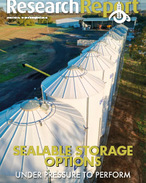This article is 3 years old. Images might not display.
Protracted rainfall and mild spring conditions have combined to delay hatchings on some areas of the Grainbelt.
The Department of Primary Industries and Regional Development (DPIRD) PestFax service has received reports of APL activity from Perenjori, Coorow and Eneabba, through to Wialki and Coomberdale, east to Beacon, Southern Cross and Burracoppin, WA.
DPIRD research scientist, Svetlana Micic, said while many crops are haying off and will not be at risk to locusts, later sown crops and green pastures could still be vulnerable, especially if there is further rainfall.
"Crops that are beginning to dry off when locusts begin to fly are especially susceptible to damage," she said.
"Recent rainfall, combined with mild weather is expected to increase the availability of green feed, particularly along roadside verges and paddock edges, which could provide sufficient food reserves for locusts to reach the next growth stage," Micic said.
There have been limited reports of APL activity from other areas of the Grainbelt.
"However, if wet and mild conditions persist, locusts could be an issue for landholders further south," Micic said.
"It is important for landholders to monitor hopper and adult locust numbers and to undertake control measures, if necessary," she said.
"Most activity would be expected in pastures so look for early hatchings and hatching egg beds in bare patches, such as around dam banks, road catchments and along fence lines," Micic said.
DPIRD recommends treating pastures, if the cost of controlling locusts exceeds the cost of replacing feed.
Micic said once locusts were on the wing, they could be difficult to control.
"The threshold for treating pastures is 20 hoppers per square metre or 10 adult APL/m2," she said.
"To achieve effective control, the best time to apply an insecticide is when locusts are at the hopper stage, ideally at the third to fourth instar growth stage, when they are one to one and a half centimetres long.
"Landholders who observed APL on their properties in autumn need to be particularly vigilant, as there are likely to be egg beds that have hatched," Micic said.
Landholders are reminded to comply with label regulations when treating pastures and crops, particularly the withholding periods.
While it is up to landholders to control locusts on their properties, DPIRD will continue to monitor APL over spring and summer and provide advice on treatment measures.
Landholders are encouraged to report observations to DPIRD's PestFax newsletter, which includes a PestFax Map of locust activity, to aid regional intelligence using the PestFax Reporter app.























